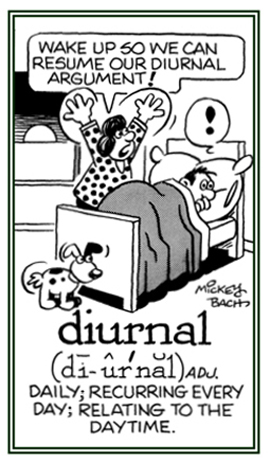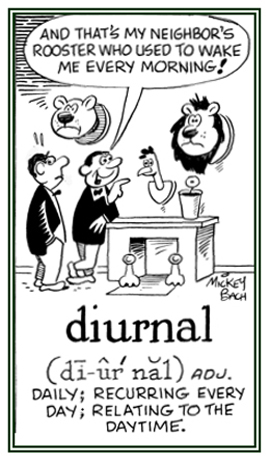2. Pertaining to something which takes place every day: A good diurnal habit is to brush the teeth in the morning and in the evening on a regular basis.
Diurnal newspapers are delivered to George's mailbox from Monday to Saturday.
3. Descriptive of a book for daily use: On their trip in Africa, Lynn kept a diurnal record in her diary about the sights she and her husband saw and their experiences along the way.
4. Characteristic of a living creature which is active during the day and inactive during the night: Apes are considered to be diurnal animals, since they are busy and lively only from morning until late in the evening.
5. A reference to a flower which opens throughout the daylight and closes at night. There are specific diurnal plants like the morning glory and the crocus.


Go to this Word A Day Revisited Index
so you can see more of Mickey Bach's cartoons.
Humans are primarily diurnal creatures
If people were really at home under the light of the moon and stars, they would go into the darkness happily and the midnight world would be visible just as it is to the vast numbers of nocturnal species on the Earth.
Instead, people are generally diurnal creatures, with eyes adapted to living in the sun's light. This is considered to be a basic evolutionary fact, even though most people don't think of themselves as diurnal beings any more than they think of themselves as primates, or mammals, or Earthlings.
Yet, it's the only way to explain the light pollution that humans have done to the night. Ill-designed lighting has washed out the darkness of night and radically altered the light levels, and light rhythms, to which many forms of life, including mankind, have adapted.
Wherever human light spills into the natural world, some aspect of the lives of other creatures is affected; including migration, reproduction, and feeding.
In most cities, the sky looks as though it has been emptied of stars, leaving behind a vacant haze that mirrors the fear people have of the dark and resembles the urban glow of dystopian science fiction; which includes, societies or states in which the conditions of human life are characterized by misery, poverty, oppression, violence, disease, and pollution.
Including first attempts to include a journal/log/blog about the work being done for the Word Info lexicon; and excerpts of articles from The Futurist magazine about "Catching Getaway Cars" with a net; "Japan's Approach to Aging and Dying"; and an introduction to an article about the "Forecasts of H.G.Wells" regarding our modern world which he made in 1900.
Including some historical prospectives about the Word Info lexicon; and more excerpts from The Futurist magazine about the "Forecasts of H.G.Wells" regarding our modern world which he made in 1900.
The first chapter includes Mr. Wells forecasts about the "decline of the steam engine and the rise of new modes of transportation".
Comments about working on the "feather, feather-like" units with links to each group of words.
There is no information about H.G. Wells' forecasts from his book Anticipations in today's journal.
Groups of word families which were completed in the past are listed with easy to follow links; including such word groups as: "feathers", "science-related topics", "rubbing", "caves", and "hair" subjects.
Another section in predictions that H.G. Wells made in 1901 about "a new way of living in the city-suburb complex" is also included.
There are also some quotes about urban growth from the UNFPA (United Nations Population Fund) whic is related to Mr. Wells' predictions.
Additional efforts to complete the aesthe-, esthe- unit continued; however, another unit of -lagnia words from the Greek-Latin element meaning, "lust, lustful, lecherous; salaciousness", etc. also required attention. The topic may not be pleasant for some users, but this is a dictionary and people need to know what such terms mean if they ever come across them.
Another section in predictions that H.G. Wells made in 1901 about "social stratification" is also included.
A few words about the special illustrated English History and Its Development. This is a very significant group of images which are geared to present a greater interest and understanding of how English developed its vocabulary.
Another section in predictions that H.G. Wells made in 1901 about "moral relativism and the decline of codes of conduct" is also included.
Special excerpts from the September 8, 2007, issue of the New Scientist and an introduction to the subject of "oxo-degradable" which was seen on the magazine wrapper.
Another special summary of an article titled, "Nothing but a ray of light" about the dangerous use of X-rays to remove excess body hair, or hypertricosis; as seen in the September 8, 2007, issue of the New Scientist and the discovery; as well as, the inclusion, of a new unit of "leg" or cruro- words and links to other "leg" related units.
A short entry today primarily about the origin and meaning of "It's all Greek to me."
Two articles from Discover Magazine pointing out potential harm to the brain resulting from stress; as well as, information about a rare affliction of "hypersomnia", or "Rip Van Winkle Disease"; also known as "Kleine-Levin syndrome".
Another short entry today because of other activities which needed attention.
Corrections were made for units uni- and nul- and some definitions were added; otherwise, there is not much to report.
Information about the word "mentor" was included today plus comments about the receipt of two missing illustrations.
